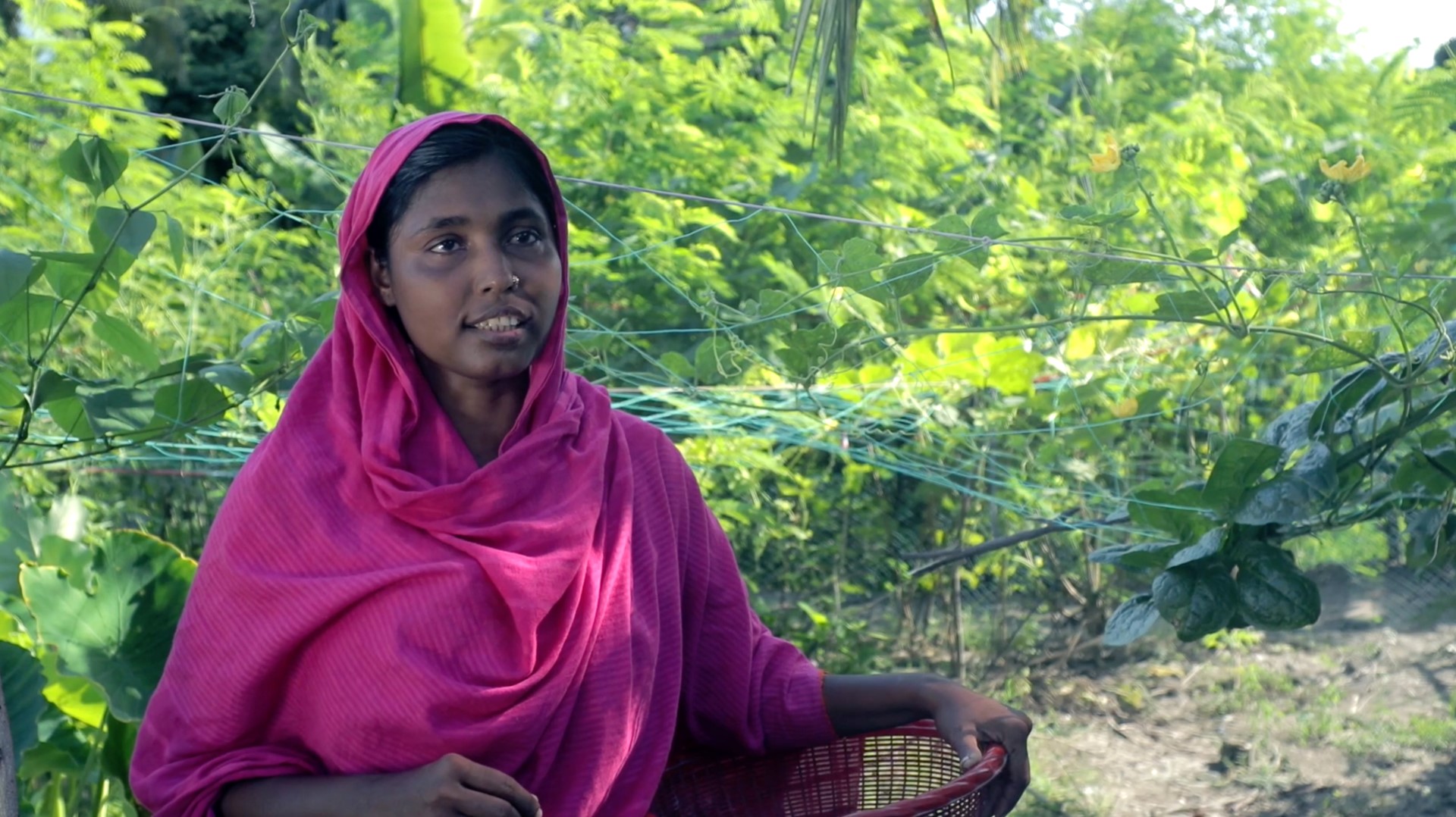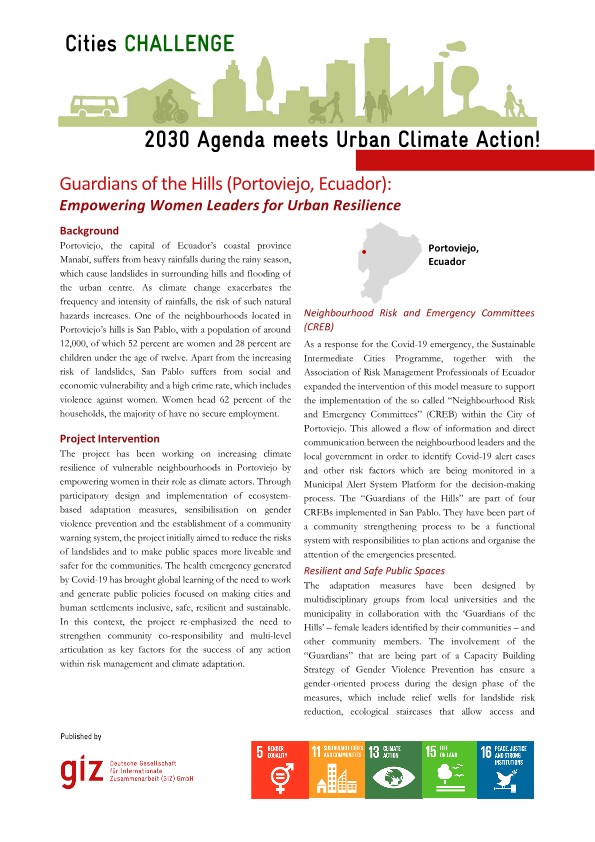Bangladesh
Enhancing Resilience of Urban Poor Measures against climate change
Satkhira, Bangladesh
The Urban Living Lab in Bangladesh is part of to the CitiesCHALLENGE 2.0 (2021-2023). According to the programme “Enhancing Resilience of Urban Poor”, the ULL develops measures to protect the urban poor community in Satkhira Pourashava against the impacts of climate change. It will improve not only the quality of life of individual residents, but also for the entire community through interventions in the public spaces.
To reduce the effects of heat islands, greening measures are being implemented on, around and next to the private houses. The resulting cultivation and sale of crop and ornamental plants enables women and girls to generate income. Additionally, a solar powered “Climate Change Digital Learning Hub” was constructed next to the public open green space. Here, the community members can increase their knowledge about municipal services, climate adaptation and mitigation measures, impact reduction and early warning systems.
Learn more about the Urban Living Lab ‘Enhancing Resilience of Urban Poor’ in Satkhira, Bangladesh.
Facts
- WHO
- WHAT
- WHEN
- WHY
- GERMAN DEVELOPMENT & COOPERATION PARTNERS
- BUDGET
10 000 € Co-Funding Anando
Suma Begum
Resident of the informal settlement of Gorer Kanda in Satkhira, Bangladesh

Suma Begum: “I hope that through this project my family can recover from the bad shortage situation and I dream of building a nice house.”
Suma Begum’s life is typical of many women living in the informal settlements of Satkhira and drawn by unrest. Her parents died early. As a 14-year-old orphan, a marriage was arranged for her, which produced her daughters Farhana (14 years) and Fatiha (10 years). But her first husband tormented her physically. That is why she finally left him. She married again and daughters Mymuna (4 years) and Maria (1.5 years) were born. Again, she is on her own, as her second husband left to India and has not taken care of her family since. Her eldest daughter lives with her grandmother and goes to school there.
Suma Begum lives in the informal settlement of Gorer Kanda in Satkhira. This is exactly where one of the four Urban Living Labs worldwide is located, which are funded by the German Agency for International Cooperation (GIZ) as part of CitiesCHALLENGE 2.0. CitiesCHALLENGE 2.0 tests innovative solutions for sustainable planning and building and contributes to the creation of climate-adapted, connected and liveable neighbourhoods. In Satkhira, the NGO Anando is implementing the Enhancing Resilience of Urban Poor (ERUP) project for GIZ. More than 100,000 people live in this medium-sized city. It is located near the Bay of Bengal. Here, the inhabitants feel the effects of climate change at first hand: Frequent floods, cyclones and salinisation of the groundwater are major problems. The result is extreme poverty. Further, in the houses, indoor temperatures often reach 42 to 44 degrees Celsius for eight months of the year.
The “ERUP” project aims to empower people to stand on their own feet and reduce the effect of heat islands and at the same time. Suma Begum’s story is a good example of this. “After a flood, I came here and built a house. Our condition was very bad at that time,” she recounts. Suma Begum was selected as one of 150 beneficiaries in a multi-stage process. The project staff encouraged and empowered her to grow vegetables at home – not only in her front yard, but also on the roof or in the backyard. Vertical gardening provides some relief for the high indoor temperatures and brings a climatic advantage for the single mother: “My house stays cool in the hot season because of the green roof.” Additional structures made of bamboo are installed on the roofs, on which creepers climb up, which also provide shade and lower the temperature indoors. The 150 families are also guided to plant mahogany, lime or betel nut trees to protect their house from the strong sunlight.
A crash course in horticulture
The better times have begun for Suma Begum with a comprehensive training course from the Department of Agricultural Extension (DAE) on climate-resilient technologies for home-based horticulture. In nine learning sessions, she first learnt what climate change is and how heat island effects occur. She learned in a very practical way how to prepare bags, plastic pots and beds or roof beds, how to sow seeds and plant seedlings, and that vegetables can also grow on bamboo trellises. In other course blocks, she was given very practical training on how to keep the soil healthy, how to apply organic fertiliser and how to fight pests with biological means. Another important learning content was also the production, collection and storage of seeds. At the end, she also learned about marketing vegetables. Suma Begum: “I now know how to grow vegetables all year round on small plots of land – in bags, on the roof, on the wall of the house or on the edge of my house.”
Suma Begum is now self-sufficient
Since attending the training, Suma Begum has practised growing vegetables with great skill and high yield. But she could not implement this without seeds, seedlings, compost, soil and pipes for collecting rainwater. All these resources were provided to her by the project in the beginning. “I planted what they told us to. Today I grow different nutritious vegetables in my front yard and on the roof of my house,” she proudly reports. The sprouts and seeds distributed by the ERUP project include bottle gourd, sweet gourd, okra, red amaranth, brinjal, kangkong, spinach, Indian spinach and lettuce. “Most of the vegetables are consumed by my daughters and myself. But if there are surplus vegetables in my garden, I sell them to my neighbours or in the market to earn some money.”
Saving money for times of crisis
Suma Begum has not only benefited materially from her participation in the ERUP project. She has also gained a lot of knowledge on the subject of horticulture. This has given her the opportunity to stabilise life for herself and her daughters through her own efforts and lay a foundation for a better life. “Our children eat vegetables from these plants. Our family is alive. We have been able to save money from the profits after selling the vegetables.” Suma Begum is participating in a savings programme. She has already saved an amount of 900 taka there. “I want to use the money for my family, for example, if a doctor’s visit has to be paid from it. I hope that through this project my family can recover from the bad shortage situation and I dream of building a nice house.”
New self-confidence as a market woman
In total, 150 families and 900 people have benefited from this project. In order to sell the vegetables even better, a so-called “Sales Cum Display Centre” is being built on a plot of land in the direct vicinity of a local market with financial support from CitiesCHALLENGE 2.0. There, the beneficiaries will be able to sell the surplus from their vegetable production at practically set-up market stalls made of regional building materials. The market women will also exchange information about their successes and problems. In this way, a new solidarity can develop among themselves. It is the best guarantee for the long-term success of the ERUP project.
Resource Hub
Factsheet Bangladesh
Download the CitiesCHALLENGE Factsheet from our Resource Hub!









